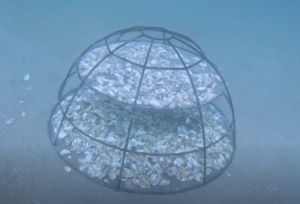
FRC with artificial reefs and coral gardening
FRC's marine biology department is embarking on a new adventure to protect and restore Fujairah's aquatic environment. The purpose of this project is to combat the negative effects of climate change, pollution and human overactivity. To achieve this, for several months now, the research center has been designing, creating and deploying various artificial reef structures aimed at welcoming new corals. Once submerged, these reefs are registered in our database and regularly surveyed to observe the evolution of the structure itself and the biodiversity attracted. In the long term, these structures will host new corals to help combat their massive diminution.To begin with, the Marine Department team planned the location of the study sites, the structures and their disposition. The chosen locations are close to the coast, in shallow waters benefiting from the wide light spectrum, and have been established as protected areas.An initial area of 300 sqm has been constructed, using bio-cement bricks. The blocks are first thrown into the water a few days before use, to allow them to soak up water and ensure greater stability once positioned. The bricks were arranged in pyramid form to maximize the contact area and to house various structures designed to host future coral fragments. Their rugged structure provides a better grip for aquatic flora (algae, corals...) and their cavities allow fauna to find shelter or to settle in: fish, invertebrates, crustaceans...
Various metal structures will be present in the 300 sqm area created by this perimeter of pyramids. These structures are of various designs, offering shelter and support for life by maximizing biological parameters: flow of water, nutrients and light. Coral beds are installed in the center of the work area to act as a nursery for the corals. The aim is to fix new coral fragments using a variety of processes, enabling them to develop, grow and form new colonies. To maximize their calcification, oyster shells from the Dibba farm are deposited on the surface near the fragments, highlighting the circular economy. Once sufficiently developed and the necessary sediment analyses carried out, the corals will be transplanted onto the artificial metal reefs previously deployed. The corals will continue to grow, gradually repopulating the oceans and playing their key role as marine organisms.In each case of fragmentation, the corals are specifically chosen according to environmental conditions and location. Most coral species are highly resilient, able to resist fluctuations (temperature, pollution, pH, human activity...). In this way, the transplanted corals will develop in a sustainable way and fully exercise their role.Another type of metal structure, made of date palm trees and oyster shells, has been created to provide shelter for marine animals. These structures promote the re-circularization of the emirates' natural resources and are undergoing further development: a biological glue is currently being tested, and will be applied to the core metal structure, as well as covering date palm leaves.
Thanks to the work of all the FRC divers and volunteers from the alpha diving club, the FRC was able to finalize the first 300sqm zone.Within a few months, all the structures deployed showed particularly convincing results in terms of the biodiversity created: fish (pufferfish, surgean fish, lionfish, stone fish, porcupine, long baner butterfly, eel fish...), invertebrates (sea cucumber, mollusks, sponges...) and various species of algae. Regularly surveyed, these areas show great promise and motivate us to continue our work on a larger scale. These structures will soon be self-sufficient and resilient against change.The FRC is currently designing new structures with new materials and shapes, in order to complete its goal of creating 40,000sqm of space dedicated to artificial reefs: date palm trees, oyster shells, metal structures and coral nursery; ultimately repopulating the vast marine biodiversity and dispersing the diver overcrowding at existing dive spots. The FRC has laid the foundations for one of the most ambitious marine conservation efforts in the region: creating reefs that offer both shelter and a home base.
